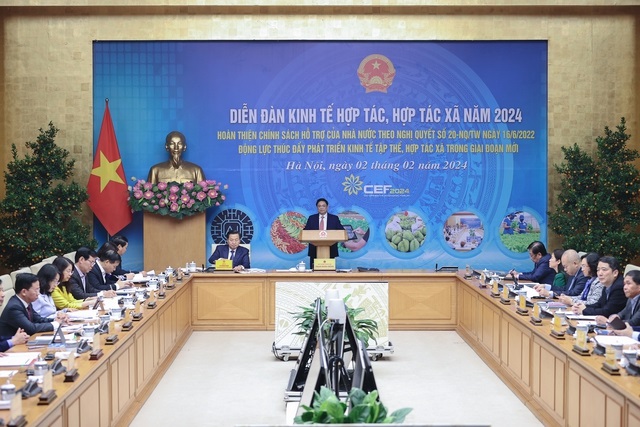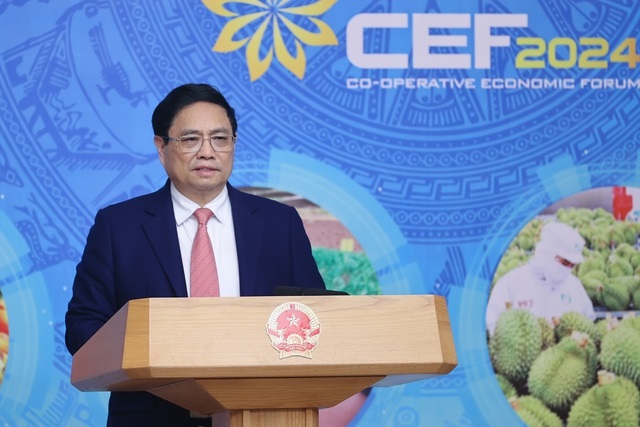On February 2nd, Prime Minister Pham Minh Chinh chaired the 2024 Economic Cooperation and Cooperative Forum with the theme “Improving support policies of the State according to Resolution No. 20-/NQ/TW dated June 16, 2022 – Motivation for promoting the development of collective economy and cooperatives in the new phase”.

Prime Minister Pham Minh Chinh requested the delegates to exchange, discuss, and share with a frank and responsible spirit, focusing on analyzing the current development of the collective economy and cooperatives – Photo: VGP/Nhat Bac
|
The Economic Cooperation and Cooperative Forum is an annual event of the Government, where delegates share, exchange, and provide important directions and policies to overcome difficulties, challenges, and take advantage of opportunities to develop the collective economy and cooperatives.
The development of the collective economy is an inevitable trend.
At the beginning of the forum, Prime Minister Pham Minh Chinh stated that towards the goal of 100 years since the establishment of the Communist Party of Vietnam and 100 years since the establishment of the country, Vietnam strives to become a developed country by 2045, with a modern industry and high average income. To achieve that goal, Vietnam mobilizes all resources in society to serve rapid and sustainable development, based on science, technology, innovation, and in accordance with the situation in Vietnam and global trends. In this context, economic cooperation and cooperatives are identified as important components.
The formation and development of cooperatives have a history of over 200 years worldwide. In Vietnam, the collective economy, with cooperatives as its core, has been formed and developed for nearly 70 years, making important contributions to the cause of national liberation, reunification, construction, and defense of the country.
The collective economy is one of the four important economic components in the socialist-oriented market economy of Vietnam. At the 5th Central Conference, 13th term, General Secretary Nguyen Phu Trong emphasized: “…consider it an important economic component that, along with the state-owned economy, is increasingly becoming a solid foundation of the national economy… We must have a clear understanding: Developing and improving the efficiency of cooperative economy is the task of the entire political system… It is a significant political task that needs to be performed on a regular basis.”
According to the Prime Minister, the development of the collective economy is an inevitable trend in the context of international integration, in line with the socialist-oriented market economy of Vietnam. Cooperative organizations operate primarily for economic benefits, while also valuing political, cultural, and social interests in their localities. They prioritize the interests of members, cooperation, collaboration, mutual assistance, and aim to enrich each member and the collective, as well as implement social policies in their localities.
In recent years, the Party, State, Government, levels, sectors, and localities have always been concerned and have issued and implemented many orientations, mechanisms, and policies to develop the collective economy and cooperatives. So far, the collective economy has fundamentally overcome long-lasting weaknesses. Cooperatives have basically completed the transition to new models. The number of cooperatives and cooperative alliances has increased significantly, and they have diversified in terms of industry, scale, and qualifications. They provide better support to members, create jobs, and increase income for workers. The linkages between cooperatives and businesses and other economic organizations have begun to develop.
However, according to the Prime Minister, the collective economy in our country has not developed as desired or required. The growth rate and contribution of the collective economy to GDP are still low. Some participants in cooperative activities still have a formalistic approach and have not fully exercised their rights and obligations. The effectiveness of cooperative activities is not high, the organizational model is loose and not suitable, and the management capacity is limited. Most cooperatives and cooperative groups have small scales, narrow scopes of activities, and low competitiveness. Joint ventures and linkages between cooperatives and other economic organizations are not widely spread.
Resolution No. 20-NQ/TW clearly states: “The preferential policies and support for the collective economy, although many, are scattered and mainly integrated, lacking concentration, lack of resources or not feasible”.
Therefore, the Prime Minister requested the delegates to exchange, discuss, and share with a frank and responsible spirit, focusing on analyzing the current development of the collective economy and cooperatives. This includes analyzing what has been achieved, what has not been achieved; the existing challenges, limitations, and causes, as well as lessons learned from the experience; analyzing the opportunities, challenges, and support needs in the collective economy and cooperatives in the coming period…
In particular, the Prime Minister hopes that the delegates will propose breakthrough solutions to overcome difficulties and obstacles, especially in attracting social resources; strengthening the cooperation among members participating in the collective economy, improving the coordination between ministries, sectors, localities, and between public and private sectors… in order to fundamentally change and strongly develop the production and business methods of the collective economy and cooperatives, meeting the requirements of the new development situation.
The Prime Minister also hopes that the delegates will provide practical and effective suggestions for supporting policies for the collective economy and cooperatives, with a focus on being appropriate within the market mechanism, providing motivation for this sector to catch up, advance, and excel compared to other economic components in the socialist-oriented market economy, especially in terms of infrastructure, technology, capital, taxes, and investment; vigorously promoting digital transformation, green transformation, circular economy, sharing economy, and knowledge economy.
 Prime Minister Pham Minh Chinh speaking at the 2024 Economic Cooperation and Cooperative Forum – Photo: VGP/Nhat Bac
|
The average revenue of cooperatives reaches nearly 3.6 billion VND per year, an increase of 35%.
According to the Ministry of Planning and Investment, it is estimated that by 2023, there will be more than 31,700 cooperatives, 158 cooperative alliances, and 73,000 joint ventures in the country. In 2022, the average revenue of cooperatives reached nearly 3.6 billion VND per year, an increase of 35% compared to 2021; the average profit was about 366 million VND per year, an increase of 71% compared to 2021; the average income of a regular worker in cooperatives in 2022 was 56 million VND per person per year…
Over the past 20 years, a common legal corridor and supportive mechanisms and policies for the collective economy have been built and improved in accordance with each stage of development. These include policies related to human resource training and development; trade promotion; application of science, technology, and innovation; support for infrastructure development investment; land allocation and leasing policies; credit policies; support for product processing…
In particular, from 2013 to 2021, over 362,000 officers and members of cooperatives were trained and developed; more than 2,600 agricultural cooperatives were supported in trade promotion with an amount of about 255 billion VND; in the period of 2013-2020, more than 5,800 cooperatives applied and transferred technology with a total funding of about 268 billion VND; the lending volume to cooperatives and cooperative alliances from 2013 to 2021 reached about 50,800 billion VND…
Cooperatives have basically completed the transition to new models according to legal regulations. The number of cooperatives and cooperative alliances established has significantly increased, with more diversity in industries, scales, and quality, providing better support to members, creating jobs, and increasing regular income for workers.
Cooperative alliances have a lean organizational structure, simple activities, but practical and better meet the flexible linkage needs and short-term interests of the people. The linkages between cooperatives, businesses, and other economic organizations have begun to develop.
The collective economy has fundamentally overcome long-lasting weaknesses, contributing to building a new countryside, ensuring security, order, and social safety, and gradually asserting its important position and role in the national economy.
With the new documents and policies of the Party and the State, especially the resolute attention and guidance of the Government, the Prime Minister, the unity, joint effort, and determination of the entire political system, as well as the support of international organizations and the investment cooperation of the cooperative community, the collective economy and cooperatives will undergo strong transformation, sustainable development, and achieve the goals of Resolution No. 20-NQ/TW.












